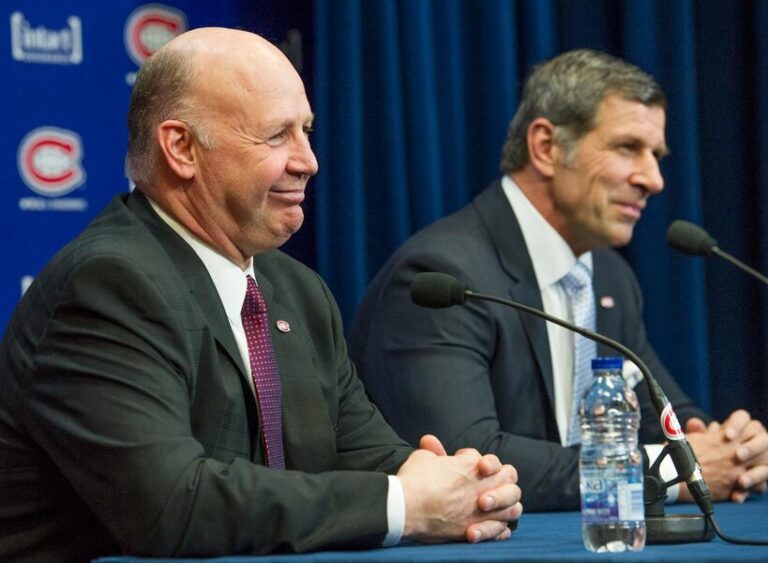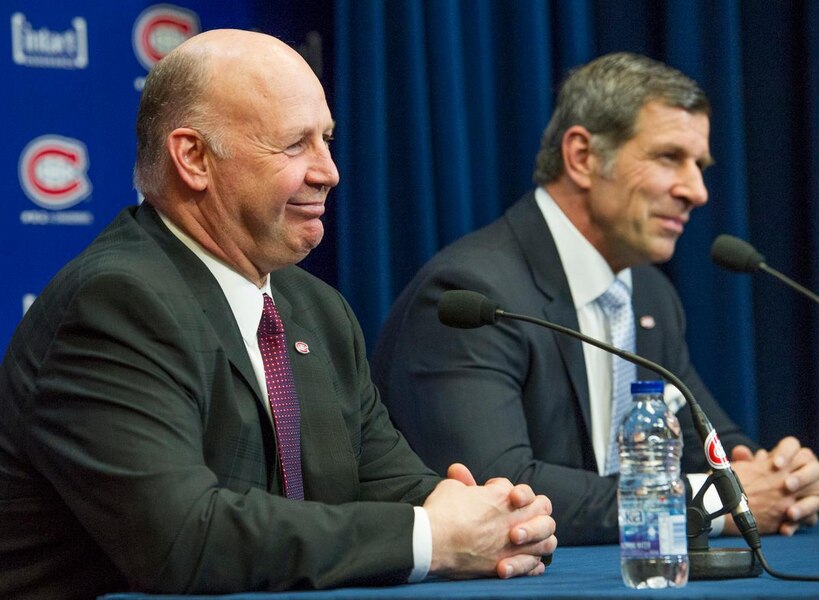

By Rick Stephens, Editor-in-Chief, All Habs Hockey Magazine
BROSSARD, QC — On Tuesday, the mob on Habs Twitter agreed to remove the Canadiens general manager from death row. Supporters of the Canadiens and the Montreal media almost universally praised Marc Bergevin’s decision to fire the head coach of his AHL affiliate.
And with the Montreal groupthink activated, the figurative noose around the neck of Marc Bergevin loosened a little.
But how did this happen?
It is the same Marc Bergevin who has failed to address the Canadiens most pressing need, a number one centre, in his six year tenure. It’s the same GM who traded away his only blue chip prospect for a middle-six left-winger, a position that is filled to overflowing in the organization.
It is the same Bergevin who swung for the fences on Alexander Semin, Jiri Sekac, Danny Briere and P.A. Parenteau and struck out miserably.
Bergevin acquired a familiar player to him in Andrew Shaw, but gave up two early second round picks which credibly could have been Alex DeBrincat and Samuel Girard. And then immediately signed Shaw to a long contract.
Bergevin fired Michel Therrien a year too late and hired a coach whose system and roster choices was holding the Boston Bruins back. And then the GM acquired players from Claude Julien’s wish list that included Dwight King, Andreas Martinsen and Steve Ott.
The last off-season can only be described as disastrous for Marc Bergevin. In addition to trading away Mikhail Sergachev, Bergevin failed to re-sign Andrei Markov and Alexander Radulov due to using disrespect and ultimatums as a negotiating tactic. Undervaluing the previous contributions of Markov and Radulov directly led to a steep decline in the production of Max Pacioretty.
The gaping holes left by the departures of Markov, Radulov, Sergachev, Alexei Emelin, Nathan Beaulieu were not adequately replaced by the acquisition of Marc Streit, Joe Morrow, Ales Hemsky, David Schlemko, Eric Gelinas and Karl Alzner. And that’s an understatement.
But even after the litany of failures, suddenly, maybe even miraculously, Bergevin stumbled upon the one decision that can be characterized as “beautiful” by the majority of fans and media. Is that what we are supposed to believe?
https://twitter.com/Luca_LaPorta/status/986301710661509120
Since that train wreck of a press conference by Bergevin and Molson, did the Canadiens GM wander around the basement of the old Montreal Forum and careen head first into a vat of enlightenment?
That’s very unlikely. But firing Sylvain Lefebvre was absolutely the right decision. Or was it?
At this point, given that you are still reading, let’s make the assumption that you are interested in learning about the operation of an AHL affiliate. Those who are mesmerized by shiny objects, such as a graph of wins/losses, and who wish to stay blissfully ignorant are probably already showing themselves to the door.
So, let’s start with the basics. What makes a great coach? Fortunately, there are several in the Canadiens history to choose from to answer that question.
Since the primary mission of an NHL team is to win games (and a Stanley Cup), an NHL coach has to be an excellent strategist to design and implement offensive and defensive systems and prepare game plans. And he must be a superb motivator and communicator.
Scotty Bowman possessed all of these characteristics. Bowman is legendary for his game preparation and ability to make adjustments. His proficiency at motivating his players is said to have resulted from them joining together to despise the coach.
In contrast, the primary mission of most AHL affiliates is not simply to win games, but instead they are tasked with the responsbility of developing prospects. That is, the AHL coaching staff’s role is to prepare prospects to play in the NHL.
In the case of the Canadiens, the offensive and defensive systems are passed down by Claude Julien (as they were by Michel Therrien.) Rosters are determined by Marc Bergevin, who also, to a large extent, determines who plays and where they play.
So, at the AHL level, it isn’t a strategist that is needed. Instead, it is a teacher.
As the Canadiens organist, is Diane Bibaud evaluated on how much popcorn she sells? Let’s hope not. So why do so many people want to evaluate the AHL coaching staff solely by wins or playoff appearances?
In the realm of fan experience, it would be nice if Bibaud’s efforts at the keyboard led to the sale of more popcorn but it is not exactly what she has been asked to do.
And what the Canadiens have asked the coaching staff in Laval to do is prepare young players to play in the NHL.
We would all like to see the successful development of players in the AHL coincide with a long run in the playoffs. But it doesn’t always work that way. To ensure the best preparation of prospects for the NHL, players have to be exposed to a variety of situations, be allowed to fail and work through mistakes.
That type of preparation can be antithetical to playing winning hockey.
Teams who are successful in the AHL are typically ones who have a string of early draft picks or who are stocked with AHL veterans. Neither describes the situation in Laval, St. John’s or Hamilton over the past few years.
It should be clear now that a simplistic evaluation of the AHL coaching staff based on playoff appearances is silly. So how do we begin to evaluate how successful Syvlain Lefebvre, Donald Dufresne, Nick Carriere and Marco Marciano have been?
Since their task is to prepare players to play in the NHL, why not research that? To narrow it down somewhat, let’s look at the number of players who benefited from the tutelage of Lefebvre (and his staff) and who played in the NHL this season. In your tabulations, you will very easily and quickly get to a number above 20.
When injuries forced Claude Julien to play the graduates from Laval, the young players performed very well. And when asked, many publicly credited their development to the work done by the AHL coaching staff.
Oh, but that isn’t what we have been told. The popular myth is that the Canadiens have few prospects.
Keep in mind that while some of those players are with the Montreal Canadiens such as Charles Hudon, Nikita Scherbak, Noah Juulsen and Charlie Lindgren, many are playing elsewhere having been traded by Bergevin. They include Sven Andrighetto, Greg Pateryn, Nathan Beaulieu and Mike Condon.
Some will quibble about the impact these players have made at the NHL level. But that is primarily a product of their draft position and the role they are given by the Canadiens coaching staff.
It should be acknowledged that there are three components to the successful development of a prospect: acquisition, preparation and transition.
The Canadiens under Trevor Timmins have done a good job with acquiring talent, primarily through the draft and particularly in later rounds. We have shown that the AHL staff have been successful in preparing prospects to play with the Canadiens.
But for two successive Habs coaches in Julien and Therrien, there has been a huge obstacle to a prospect’s successful transition to the NHL.
So tell me again why it was the right move to fire Sylvain Lefebvre? And why aren’t Julien and Bergevin being held to account?
The sad truth is that Lefebvre was the scapegoat, a sacrifice offered up by Bergevin and Molson to the media gods. And the Canadiens co-GMs knew that the decision would be blindly lapped up.
The prospects who graduated from AHL were significantly improved after spending time with Lefebvre and company. Whether it is learning to play without the puck, bracing to take a hit to make a play, improving foot speed or developing confidence, these are lessons that are not easily recognized by a quick glance of the stats sheet.
So unless, folks are covering each game, attending practices and speaking to players regularly, it is difficult to discern their progress and the influence of their coaches.
And the record of the Rocket? It’s not a coincidence that poor defensive coverage, lack of production and an ineffective penalty-kill were common to both the Canadiens and the Rocket. Systems are controlled by Montreal as is the personnel.
Bergevin knows the real story. But he is happy to take advantage of a lack of awareness. It’s what happened on Tuesday and it appeased the rowdy mob angrily yelling for the GM to do something.
Something was done. But, the bottom line is, firing a person who was doing their job does little to bring the Canadiens organization closer to a Stanley Cup.